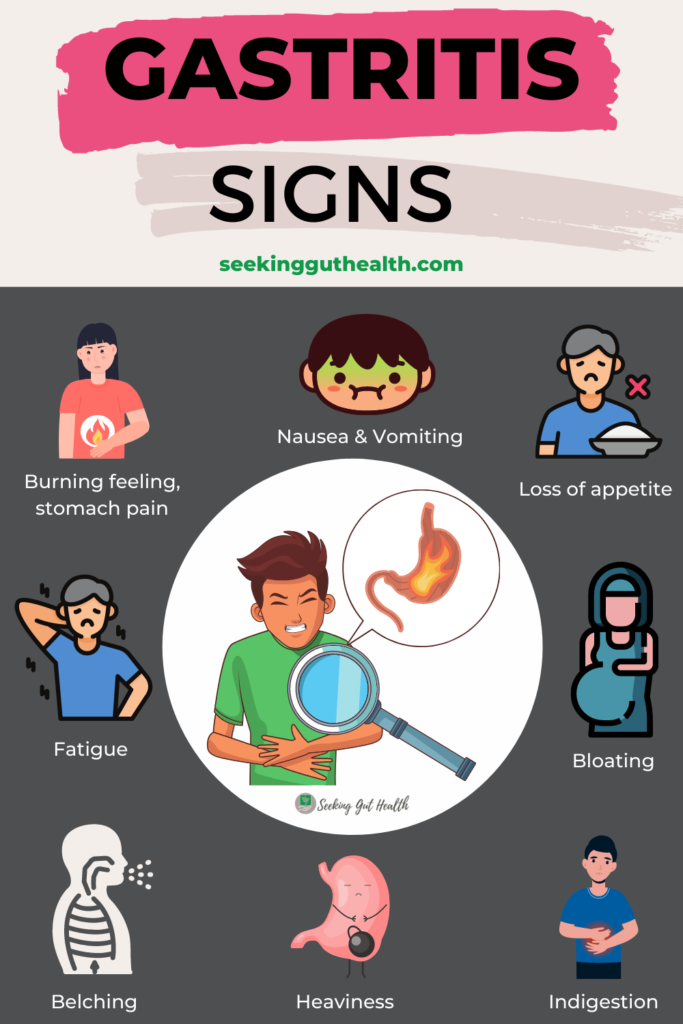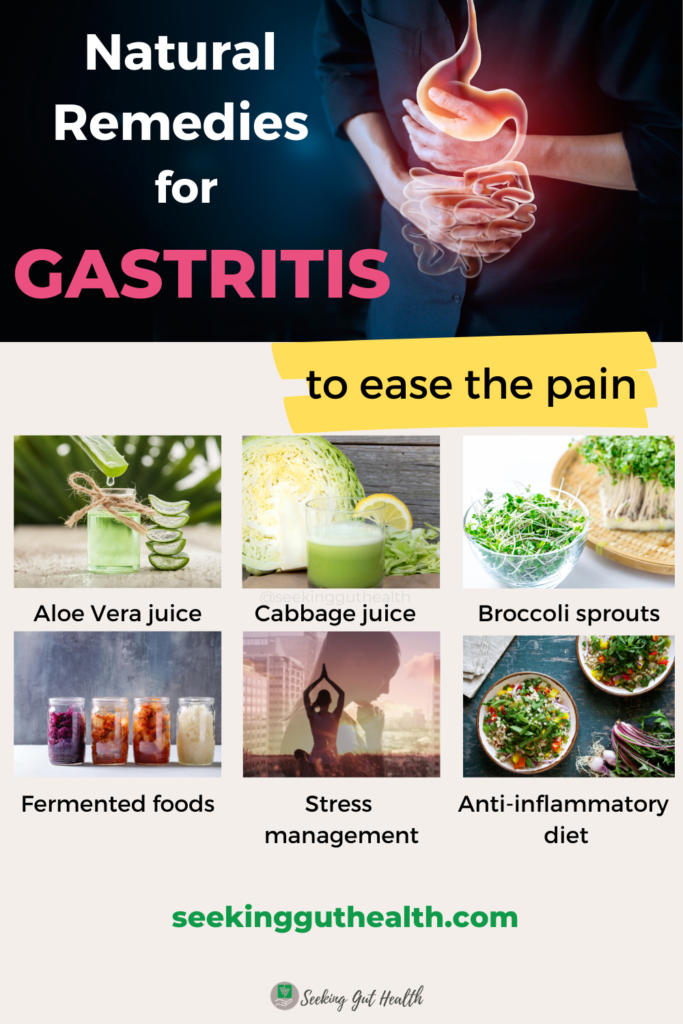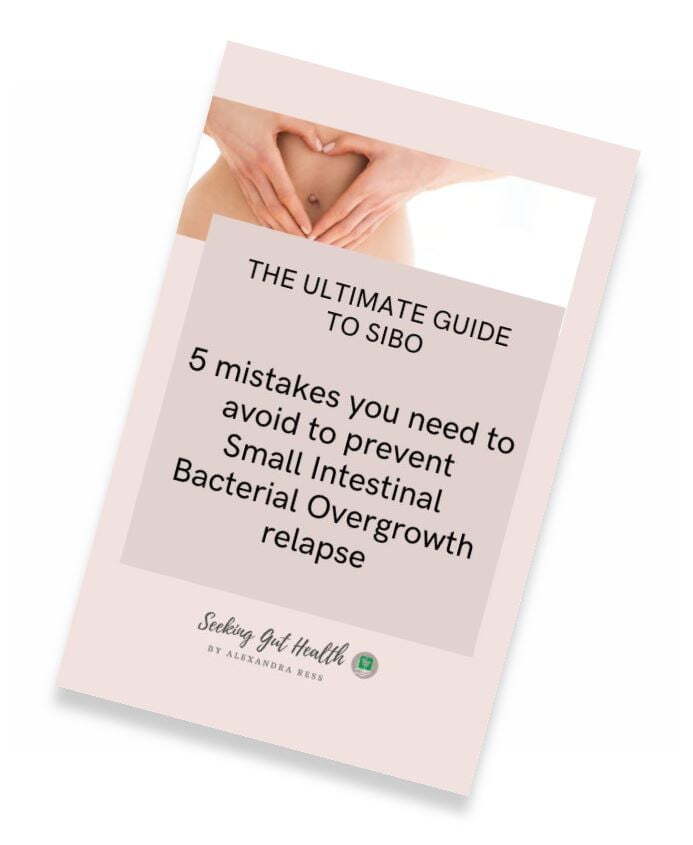My short Gastritis story
When I went through a stressful period in my early thirties, one day, all of a sudden, I found myself lying in a fetal pose on the floor with unbearable burning pain in my stomach. My gut just signaled me; that was enough. I went to the GI doctor, who diagnosed me with Gastritis.
The solution in my story was to deal with the stress by using "energy healing," working on my current mindset, changing eating habits, and using natural remedies to overcome Gastritis quite quickly.
Let's learn about this condition in more detail!

What is Gastritis?
Gastritis refers to the inflammation and or swelling of the stomach lining. The stomach lining has a vital role. It contains cells responsible for the acid and enzyme production that support the digestion process by breaking down the food into smaller particles and mucus production, which protects the stomach lining from acid.
The process looks like digestive juices cause damage and inflame the stomach lining resulting in Gastritis. Therefore less enzymes, acid, and mucus will be produced. Gastritis can be acute, chronic, or atrophic.
Acute Gastritis happens mostly suddenly with severe symptoms and inflammation in the stomach lining. If the irritation is happening for an extended time, then it becomes atrophic Gastritis.
What are the signs of Gastritis?
Gastritis doesn't always cause symptoms, but when it does, these can be the most common signs:
- Stomach pain (sharp or burning feeling, usually upper abdominal)
- Belching
- Nausea, even vomiting
- Bloating
- Indigestion
- Feeling of fullness even after eating a few bites (but might be still hungry)
- Loss of appetite
- Fatigue
There can be blood in the stool or vomiting, sweat, racing heart, etc. This state requires medical attention. (1)
How is Gastritis diagnosed?
Generally, your GI doctor performs an endoscopy (a tube inserted into your stomach through your throat) to check for any inflammation or abnormalities. Your doctor may also take a small piece of a sample (a biopsy) from the stomach lining. A blood test, stool test, or even X-ray can be ordered as well. (2)
What causes Gastritis?
There can be several reasons why Gastritis can happen:
- Helicobacter pylori infection – this is a bacteria that can lower stomach acid production, cause inflammation, ulcers, and is primarily associated with stomach cancer. (3)(4)
- Other fungal (e.g., Candida (5)), bacterial (6) viral, parasitic infections
- Alcohol consumption and smoking (7)
- Certain drugs and medications:
- The overuse of Proton Pump Inhibitors (PPIs) – PPIs are tricky since they are commonly used to reduce the inflammation caused by Gastritis and in the treatment of H. pylori infection, but being long-term on PPIs can actually cause Gastritis and even SIBO (Small Intestinal Bacterial Overgrowth) (8)(9)
- Usage of Nonsteroidal Anti-Inflammatory Drugs (NSAIDs) can contribute to ulcers. (10)
- Extreme stress or trauma can also trigger Gastritis (commonly called Stress-induced Gastritis). A study showed that long-term stress could indeed cause inflammation. During stressful periods, the body secretes more acid. The mucus layer on the stomach lining is broken down (which would typically have a protective function against acid), so this negative process exposes the stomach to injury. (11) (12) No wonder, since our gut and our brain are connected.
- Bile reflux means that the bile flows upward (refluxes) from the duodenum into the stomach and even moves back up into the throat. Refluxed bile can cause irritation and inflammation. (13) Normally, the sphincter keeps acid and other stomach contents from going back up your esophagus from the stomach when it functions properly and closes. (14)
- Autoimmunity is when the body's immune system starts attacking its own cells. "Leaky gut" can be a significant contributing factor to autoimmune conditions (15), besides genetic predisposition and environmental factors. When there is a leaky gut, then food particles will not completely be digested, and in this form, they can leak into the bloodstream. The immune system gets alerted and sees these elements as potential invaders triggering an inflammatory response, which further aggravates an autoimmune disease. This process can result in autoimmune Gastritis when the immune system attacks the lining of the stomach. (16)
- SIBO (Small Intestinal Bacterial Overgrowth) – meaning an excess bacteria present in the small intestine, causing bloating, diarrhea and/or constipation, and other digestive and non-digestive symptoms. The abundance of these bacteria may cause gastric inflammation. However, the study suggested that there can be a higher severity of stomach inflammation and increased overgrowth due to low stomach acid production in patients with severe H. pylori-induced gastritis. (17)
- Poor eating habits and specific dietary factors: Processed, spicy, acidic foods, coffee, and excess sugar consumption – certain foods may trigger or worsen the symptoms. (18)(19)
Imagine taking back control of your body and living bloat-free. Download your free guide and learn the 5 MISTAKES you need to AVOID TO PREVENT SMALL INTESTINAL BACTERIAL OVERGROWTH RELAPSE.
Grab your copy today!
Treatment options for Gastritis
Allopathic medicine offers different treatment options that include proton pump inhibitors to block stomach acid production. They can also prescribe Antacids or H2 blockers for the same reason. In case the underlying cause is H. pylori infection, they usually recommend "Triple therapy."
These can help short-term by relieving gastritis symptoms and allowing your stomach lining to heal, but long-term use can lead to several diseases, not to mention side effects. Unfortunately, they also don't address the root causes of this condition.
You need to discuss the treatment options with your healthcare provider, and there are cases when these medications are required.

How to overcome Gastritis Naturally
1. Address the underlying cause of Gastritis whenever is possible
Treatment may vary depending on what is causing your symptoms. Some people may be more prone to develop Gastritis than others. If H. pylori infection is causing the problem, then it needs to be eradicated.
Regardless of the cause, it is always crucial to reduce inflammation.
2. Follow an anti-inflammatory diet
When the stomach lining is "on fire," you want to dampen this by avoiding inflammatory foods such as spicy & hot foods, coffee, wheat, alcohol, sugar, processed foods, dairy, hydrogenated oils, trans fats, and any possible trigger of yours.
Writing a food journal or following an elimination diet may also help you identify your triggers. This is even more vital if you have an autoimmune condition.
Nourish your body with whole anti-inflammatory foods: vegetables (especially leafy greens, broccoli sprouts), fruits (berries, and dark-colored fruits), healthy fats (coconut oil, olive oil), whole grains, fish and meat, fresh green herbs, plant-based proteins.
In the beginning, you may find digesting pureed vegetables easier.
3. Lifestyle matters
If you are similar to me, super sensitive to stress, then stress management should be part of your life every day. There are many ways, and you need to find a few techniques that are closer to your personality. I found journaling is a great way to deal with extra stress and anxiety. Coping with stress may even start with saying no to certain tasks or people you don't feel aligned with. If you are new to this, having a "guided" journal** is the best way to get started.
But exercise, meditation, listening to your favorite music are also great ways.
While some of these lifestyle recommendations may seem easy, in reality, it requires quite a commitment to change a habit. But it is possible! It is a journey.
4. Use natural gut supporting nutrients
- Specific mucogenic agents can help protect the gut lining, such as slippery elm, marshmallow root, mastic gum, aloe vera juice, and DGL (deglycyrrhizinated licorice). (20) These plants should be avoided if you have active SIBO or are only used in the healing phase.
- Turmeric (Curcumin) has potent antioxidant and anti-inflammatory properties. A study showed that turmeric capsules were used as a treatment for 4 weeks for patients with Gastritis and dyspepsia. In the first and second week of the treatment, their abdominal pain and discomfort decreased, and they could eat normal foods again. (21) Furthermore, turmeric seemed to be the most effective in killing H. pylori. (22)
- Picrorhiza kurroa rhizomes is a medicinal plant traditionally used in Ayurvedic medicine for the treatment of digestive problems. According to a study, this remarkable plant could effectively heal stomach ulceration (in mice). (23)
- Fresh cabbage juice is a common natural remedy for gastritis and peptic ulcers. It contains antioxidants and several vitamins, but the most prominent is "vitamin U" which has a role in the healing of the stomach lining. (24) Another study found that cabbage juice, especially mixed with chlorella or kale, has significant anti-gastritis effects and can be used for a long time to prevent and treat gastric cancer and Gastritis. (25) (Ye-Ji Hong, 2013)
5. Try fermented foods as probiotics
Fermented foods don't just taste great but have many beneficial effects not just on the gut but also on nearly every health aspect.
Most traditional fermented foods and drinks, such as sauerkraut, kimchi, kefir, tempeh, kombucha, etc., are natural sources of probiotic microorganisms. Studies showed that regular consumption of these probiotic foods might control H. pylori and has a preventative impact against peptic ulcers and stomach cancer. (26)(27)
The best fermented foods are Lacto-fermented foods with living cultures. They shouldn't contain any preservatives, vinegar. These products are primarily found in the refrigerated section in the stores if you don't use homemade.
Whenever you feel like starting incorporating more fermented foods into your diet, start slowly.
The Bottom line
Gastritis is an irritation or injury to the stomach's lining. If Gastritis is left untreated, it can lead to stomach bleeding, ulcers, and even stomach cancer. Your GI doctor can perform tests to define the level of inflammation and if you H. pylori infection or other contributing factors.
Depending on your health situation, you might choose conventional treatment or deal with your condition with natural remedies. Regardless of the cause of Gastritis, reducing inflammation should always be the center of your focus. One of the best tools is to follow an anti-inflammatory diet, including plenty of antioxidants and whole foods that support the healing process. You can boost the regeneration process of the stomach by incorporating natural nutrients, fermented foods and changing your current lifestyle by quitting smoking, eating smaller meals, and reducing stress.
*This post is only for informational purposes; and not meant to diagnose, or treat any disease. I advise consulting with your healthcare practitioner regarding any treatment options or dietary changes.
**The post contains affiliate links! If you purchase anything through these links, I will receive a commission at no extra cost to you.
- The National Institute of Diabetes and Digestive and Kidney Diseases (NIDDK). November 27, 2013. Archived from the original on 6 March 2015. Retrieved 1 March2015
- Kayaçetin, S., & Güreşçi, S. (2014). What is Gastritis? What is gastropathy? How is it classified?. The Turkish journal of gastroenterology : the official journal of Turkish Society of Gastroenterology, 25(3), 233–247. https://doi.org/10.5152/tjg.2014.7906
- Sipponen, P., & Hyvärinen, H. (1993). Role of Helicobacter pylori in the pathogenesis of Gastritis, peptic ulcer and gastric cancer. Scandinavian journal of gastroenterology. Supplement, 196, 3–6. https://doi.org/10.3109/00365529309098333
- Nordenstedt, H., Graham, D. Y., Kramer, J. R., Rugge, M., Verstovsek, G., Fitzgerald, S., Alsarraj, A., Shaib, Y., Velez, M. E., Abraham, N., Anand, B., Cole, R., & El-Serag, H. B. (2013). Helicobacter pylori-negative Gastritis: prevalence and risk factors. The American journal of gastroenterology, 108(1), 65–71. https://doi.org/10.1038/ajg.2012.372
- Mason, K. L., Erb Downward, J. R., Falkowski, N. R., Young, V. B., Kao, J. Y., & Huffnagle, G. B. (2012). Interplay between the gastric bacterial microbiota and Candida albicans during postantibiotic recolonization and Gastritis. Infection and immunity, 80(1), 150–158. https://doi.org/10.1128/IAI.05162-11
- Naylor, G., & Axon, A. (2003). Role of bacterial overgrowth in the stomach as an additional risk factor for Gastritis. Canadian journal of gastroenterology = Journal canadien de gastroenterologie, 17 Suppl B, 13B–17B. https://doi.org/10.1155/2003/350347
- Roberts D. M. (1972). Chronic Gastritis, alcohol, and non-ulcer dyspepsia. Gut, 13(10), 768–774. https://doi.org/10.1136/gut.13.10.768
- Mukaisho, K., Hagiwara, T., Nakayama, T., Hattori, T., & Sugihara, H. (2014). Potential mechanism of corpus-predominant Gastritis after PPI therapy in Helicobacter pylori-positive patients with GERD. World journal of gastroenterology, 20(34), 11962–11965. https://doi.org/10.3748/wjg.v20.i34.11962
- Lombardo, L., Foti, M., Ruggia, O., & Chiecchio, A. (2010). Increased incidence of small intestinal bacterial overgrowth during proton pump inhibitor therapy. Clinical gastroenterology and hepatology : the official clinical practice journal of the American Gastroenterological Association, 8(6), 504–508. https://doi.org/10.1016/j.cgh.2009.12.022
- Peterson W. L. (1996). The influence of food, beverages and NSAIDs on gastric acid secretion and mucosal integrity. The Yale journal of biology and medicine, 69(1), 81–84.
- Kim, Y. H., Lee, J. H., Lee, S. S., Cho, E. Y., Oh, Y. L., Son, H. J., Rhee, P. L., Kim, J. J., Koh, K. C., Paik, S. W., Rhee, J. C., & Choi, K. W. (2002). Long-term stress and Helicobacter pylori infection independently induce gastric mucosal lesions in C57BL/6 mice. Scandinavian journal of gastroenterology, 37(11), 1259–1264. https://doi.org/10.1080/003655202761020515
- Megha R, Farooq U, Lopez PP. Stress-Induced Gastritis. [Updated 2021 Apr 19]. In: StatPearls [Internet]. Treasure Island (FL): StatPearls Publishing; 2021 Jan-. Available from: https://www.ncbi.nlm.nih.gov/books/NBK499926/
- Cai, J., & Jia, B. Q. (1989). Zhonghua nei ke za zhi, 28(2), 89–126.
- Boeckxstaens G. E. (2005). The lower oesophageal sphincter. Neurogastroenterology and motility : the official journal of the European Gastrointestinal Motility Society, 17 Suppl 1, 13–21. https://doi.org/10.1111/j.1365-2982.2005.00661.x
- Fasano A. (2012). Leaky gut and autoimmune diseases. Clinical reviews in allergy & immunology, 42(1), 71–78. https://doi.org/10.1007/s12016-011-8291-x
- Lenti, M. V., Rugge, M., Lahner, E., Miceli, E., Toh, B. H., Genta, R. M., De Block, C., Hershko, C., & Di Sabatino, A. (2020). Autoimmune Gastritis. Nature reviews. Disease primers, 6(1), 56. https://doi.org/10.1038/s41572-020-0187-8
- Naylor, G., & Axon, A. (2003). Role of bacterial overgrowth in the stomach as an additional risk factor for Gastritis. Canadian journal of gastroenterology = Journal canadien de gastroenterologie, 17 Suppl B, 13B–17B. https://doi.org/10.1155/2003/350347
- Lin, S., Gao, T., Sun, C., Jia, M., Liu, C., Ma, X., & Ma, A. (2019). Association of dietary patterns and endoscopic gastric mucosal atrophy in an adult Chinese population. Scientific reports, 9(1), 16567. https://doi.org/10.1038/s41598-019-52951-7
- Li, Y., Su, Z., Li, P., Li, Y., Johnson, N., Zhang, Q., Du, S., Zhao, H., Li, K., Zhang, C., & Ding, X. (2020). Association of Symptoms with Eating Habits and Food Preferences in Chronic Gastritis Patients: A Cross-Sectional Study. Evidence-based complementary and alternative medicine : eCAM, 2020, 5197201. https://doi.org/10.1155/2020/5197201
- The Healing Power of Herbs, 2nd Ed., Murray, Michael, Prima Publishing, Rocklin, CA, 1995.
- Prucksunand, C., Indrasukhsri, B., Leethochawalit, M., & Hungspreugs, K. (2001). Phase II clinical trial on effect of the long turmeric (Curcuma longa Linn) on healing of peptic ulcer. The Southeast Asian journal of tropical medicine and public health, 32(1), 208–215.
- O'Mahony, R., Al-Khtheeri, H., Weerasekera, D., Fernando, N., Vaira, D., Holton, J., & Basset, C. (2005). Bactericidal and anti-adhesive properties of culinary and medicinal plants against Helicobacter pylori. World journal of gastroenterology, 11(47), 7499–7507. https://doi.org/10.3748/wjg.v11.i47.7499
- Banerjee, D., Maity, B., Nag, S. K., Bandyopadhyay, S. K., & Chattopadhyay, S. (2008). Healing potential of Picrorhiza kurroa (Scrofulariaceae) rhizomes against indomethacin-induced gastric ulceration: a mechanistic exploration. BMC complementary and alternative medicine, 8, 3. https://doi.org/10.1186/1472-6882-8-3
- CHENEY G. (1949). Rapid healing of peptic ulcers in patients receiving fresh cabbage juice. California medicine, 70(1), 10–15.
- Ye-Ji Hong, S. Y.-l.-Y. (2013, May). Inhibitory Effects of Cabbage Juice and Cabbage-Mixed Juice on the Growth of AGS Human Gastric Cancer Cells and on HCl-Ethanol Induced Gastritis in Rats. Journal of the Korean Society of Food Science and Nutrition 42(5), 42. doi:DOI:10.3746/jkfn.2013.42.5.682
- Nair, M. R., Chouhan, D., Sen Gupta, S., & Chattopadhyay, S. (2016). Fermented Foods: Are They Tasty Medicines for Helicobacter pylori Associated Peptic Ulcer and Gastric Cancer?. Frontiers in microbiology, 7, 1148. https://doi.org/10.3389/fmicb.2016.01148
- World Journal of Gastroenterology. (2010, April 11). Therapeutic effect of fermented milk on chronic Gastritis. ScienceDaily. Retrieved July 7, 2021 from sciencedaily.com/releases/2010/04/100409093213.htm

Alexandra is a Functional Medicine Certified Health Coach & Holistic Nutritionist specializing in IBS, SIBO, and Gut Health. She helps her clients identify the root causes of their chronic gut issues with functional testing, supporting their bodies holistically and implementing the necessary lifestyle changes long-term to regain control of their bodies and enjoy food freedom. Book your FREE SIBO Assessment call now >>>

